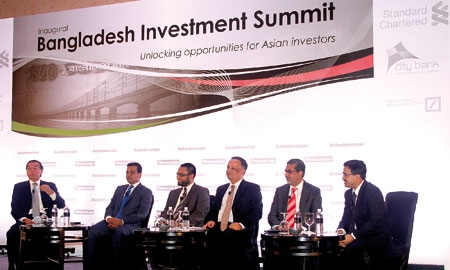Over the past four years, Bangladesh has had the fifth fastest growing economy in the world. Between 2009 and 2012, it averaged expansion of 6.3 per cent, mainly thanks to growth in manufacturing, exports and agricultural output.
Exports grew 19.3 per cent during the same period and were valued at $24 billion in 2012. This coupled with a dip in imports and a surge in remittances from Bangladeshis abroad (which passed the $14 billion mark last year) has helped the stock of forex reserves to grow and hit a record high of $14.83 billion in April this year. With such impressive growth, it is no wonder that Goldman Sachs has included it on the list of the ‘Next 11’.
Moody’s has given the country a Ba3 stable rating for the past four years (2010-2013), while Standard & Poor’s has given a BB- sovereign rating for three consecutive years (2010-2012).
Finance Minister Abul Maal Abdul Muhith believes the country has done well but the main hindrance to growth has mainly been power supply. “Growth of the economy has been impeded somewhat by the backwardness in the energy sector,” he says. “Bangladesh needs an adequate availability of energy and power, whether it is in the form of electricity or it is other energy sources like gas, coal, etc.”
Second is transportation infrastructure: “Standards are very poor. There are not too many paved roads and the standard of those is also poor. So, we have to improve because currently we have some roads where the maximum capacity is 10 tonnes yet most of our regional roads have only three tonnes capacity. You do not use three tonnes capacity for transportation now; you go for seven, 10 and so on. My own prescription is that we have enough roads, therefore our future policy has to be on maintenance and upgrading,” highlights the Finance Minister.
The country’s banking and finance sector will be instrumental in ensuring that the country continues to grow and becomes one of Goldman Sachs ‘Next 11’, be it through investing in vital infrastructure projects, financing the country’s exporters, manufacturers and young entrepreneurs, or providing micro-financing to SMEs.
“Mobile banking has helped people in so many ways. One is that mobile banking has certainly promoted remittance through official channels”
Abul Maal Abdul Muhith,
Minister of Finance |
Moreover, Governor of Bangladesh Bank (BB) Dr Atiur Rahman says, “Today, 50 per cent of the economy is driven by the services sector, so financial intermediation plays a vital role. We at the Central Bank have taken the initiative by improving automation, while commercial banks such as HSBC can bridge the gap between local and international activities.”
Andrew Tilke, CEO of HSBC Bangladesh, comments, “If there is a robust banking sector, then there is going to be robust growth.” Like so many investors coming to Bangladesh, HSBC sees significant opportunities here, and so has designated the country as one of its top 20 global priorities.
Bangladesh’s finance sector has grown considerably. Total assets and deposits of the commercial banks grew 324.2 per cent and 326.9 per cent respectively between 2001 and 2011. In total, there are 52 “scheduled” and four “non-scheduled” banks (a scheduled bank is one licensed to operate under the Bank Company Act, whereas a non-scheduled bank is one that has been established for a specific goal and operates under the act introduced to achieve that goal), 31 non-bank financial institutions (NBFIs) and 62 insurance companies.
One of the main challenges for BB has been financial inclusion. Its strategy has focused on micro-financing for SMEs and providing mobile banking for those who do not have access to traditional banking services.
“Mobile banking has helped people in so many ways. One is that mobile banking has certainly promoted remittance through official channels,” says Mr Muhith. “It has made transfers very simple and risk-free. I know that because I have my mobile telephone in my own hand, only I can take the transferred money. It is in every way efficient and corruption free.”
BB has approved services such as: foreign remittances, cash in/out using m (mobile)-wallets, and private-to-private, business-to-private and government-to-private payments. All these services are aimed at financial inclusion for the 75 per cent of Bangladeshis who don’t have access to the formal banking sector. Around 3 million people are now using 70,000 mobile banking service outlets in Bangladesh and the number will continue to grow.
The Government itself has introduced online tendering in some of its main agencies, such as those responsible for awarding contracts for road building, waterworks, flood protection and power generation, for example. Major tendering processes have been put online and the rest are under way. The aim is that, except for small local works contracts, nearly everything will be online in four to five years’ time. l

2 COMMENTS
Bangladesh has potential to become a strong global economy
Bangladesh is beating India in all the standard measures of development: e.g.: maternal health, female literacy or life expectancy